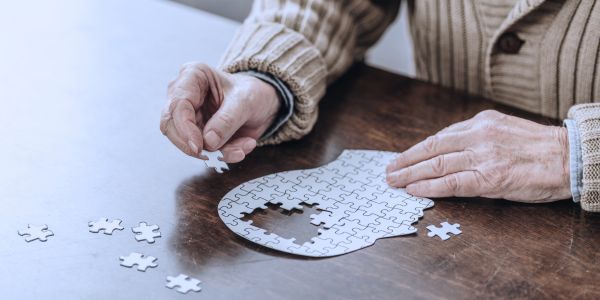Show What is the Change: Dementia Can Develop Over Time

Introduction
Dementia is a very difficult disease for many people. Its beginning stages are very important to realize in order to act in the most effective way. This is not a disease in itself, but a syndrome that reflects a loss of the functional ability to remember, think or perform daily activities. Alzheimer’s disease is the most well-known case of dementia; however, there are numerous more forms. Here, we will describe the less obvious warning signs of dementia and offer suggestions on how to prevent them.
1. Confusion
Lack of clarity to the point of confusion other than simple forgetfulness is very common in the early stages of dementia. This may include:
- Not knowing where you are and how you got there
- Not knowing what date or season it is or how much time has gone by
- Not being able to follow the train of thoughts in conversations or stories
It is important to keep in mind that while most people do experience episodes of confusion, prolonged and increasing episodes of confusion can be worrying.
2. Short-term Memory Changes
For most people, once in a while it is okay to misplace one’s keys. Still, ‘forgetting your keys’ regularly in the early stages of dementia is an indicator. Keep looking for:
- Repeating questions already asked
- Not remembering what has just been taught
- Using others’ memories too often for things you used to do by yourself

3. Trouble Finding the Right Word
Language related disorders are related to problems with thinking and therefore early signs of mental deterioration. This could involve:
- Having to pause for too long to find the right word even when talking
- Supplying names for common objects with unfit or uncommon ones
- Following conversations or engaging in them becomes a challenge
Do not be particularly stressed out on what you regard as ‘word-finding problems’ from time to time because these are especially common when people grow older. The problem with this is that these problems become more constant over time and get worse.
Also Read: 9 Benefits of Olive Oil in Your Body
4. Navigation Problems
Obtaining spatial cognition and problems in navigating can be early symptoms of dementia. Observe the patient for:
- Lost in places that are known to them
- Following instructions can be a challenge
- Problems judging distance or depth
Such symptoms, especially diagnosis driving as easy, may not be the case, and this may be very dangerous.
5. Change In Behavioral Patterns
This is not always true for patients suffering from dementia, but an unusual change in mood is always an early indicator. Therefore, some of these signs may include that one can be depressed with quite the reason:
- Mood changes for no apparent reason
- Absurd temper tantrums
- More violence or angry than usual
It is also important to understand how these are different from the other mental health problems and from emotional reactions to normal events in one’s life.
6. Inability to Plan and Organize
The loss of the ability to plan and organize can be gradual in onset and easy to overlook. Typically, these skills do not deteriorate overnight, but the following assists in the assessment of:
- Inability in control one’s budget
- Difficulty in preparing food or undertaking activities as per a set guide
- Inability to perform a sequence of actions in jobs
These problems tend to present themselves in work environments or in the execution of domestic chores.
7. Impaired Sense/Sensation
Loss in the ability to perceive, though Rare, may be an early symptom of particular types of dementia. It could include some of the following:
- Visual impairment, however, is unassociated with any disease of the eyes
- Inability to smell
- Changes in taste sensations
These changes are insidious and only diagnosed if other diagnoses have been excluded.
Latest Tips:
- 8 TOP Foods To Help Improve Your Eyes Naturally
- 4 Symptoms of Gallbladder Problems You Must Know
- 12 Common Warning Signs Of ADHD You Shouldn’t Ignore
- 11 Super Benefits of Eating Ginseng Every Day
- 10 Heart Healthy Foods After Age 50+ You Must Eat!
8. Lack of Interest in Things
People who ignore hobbies or leisure activities that they have previously enjoyed may present an early symptom of dementia. This might take shape as:
- Avoiding social places
- Not wanting to do anything to get things done or enjoy the activity
- Presenting emotionless or not engaging in emotional activity
While some present with apathy due to the condition of dementia and others due to depression, one should make a distinction on the two aspects.

9. Poor Decision Making
A decreased degree of judgment and reasoning skills can also lead to wrong decisions. Keep an eye on:
- Getting scammed or making bad investments
- Having problems and puzzles that used to be more manageable
- Choosing options that a person would not have chosen before
These transformations can be quite alarming, especially when they endanger an individual’s safety or financial security.
10. Frequent Constipation
It is worth noting recent studies have found a correlation between the state of gut health and brain health. For example, recurrent constipation may be an early sign of dementia related concerns. Watch out for:
- Such chronic constipation with no apparent medical reasons or changes in diet or lifestyle
- Alteration in the frequency of stools together with other manifestations of cognitive impairment
While constipation is not a significant indication of dementia, it is important to recognize this concerning health transitions.
Ways to Avoid Dementia
There are no sure ways of avoiding dementia, but the following lifestyle changes might be of help as far as lowering the risk is concerned:
- Keep the mind occupied
- Fiddle with crosswords, read books, or master something new
- Further studies or learn a different activity
- Keep fit
- Try and go for moderate exercise for not less than two and a half hours a week
- Do both aerobic and anaerobic workouts
- Watch what you eat
- Be on a diet that features the Mediterranean diet, which should have more of vegetables fruits and a lot of grains
- Stay away from too much junk foods and free for generals
- Interact with other people
- Have lots of people with whom you relate closely
- Be engaged with the society or participate in charity work
- Keep watchful of the disease
- Maintain normal blood pressure, normal sugar level and normal cholesterol level
- Confer with a doctor in case of depression and hearing problem
- Adequate sleep
- Seven and nine hours of sleep should be targeted every day
- Treated such as sleep apnea and other disorders
- Drug habits
- Do not smoke
- Cut down the intake of alcohol

How to Know It’s Time to Seek Help
If you or someone you know has been demonstrating several of these symptoms regularly and if they interfere with normal functioning, professional help should be sought without further delay. Without a doubt, an early diagnosis can enhance the control and halt the deterioration of the type of dementia a person suffers from.
Also Read: 5 Indoor Plants That are Beneficial for Your Health
Always remember, is always possible to have several of these signs without suffering from dementia. These symptoms could be due to other illnesses which can be treated. But better safe than sorry, and one should get such symptoms checked.
As a result, maintaining an up-to-date understanding of one’s cognition as well as engaging in preventative measures such as these, enables the individual to take measures to ensure that his or her years ahead are free from decline and are of high quality.
Conclusion
It is important to note that there is no single way to cure dementia. It is also true that people should seek help from their professional in order to get to the root cause of these symptoms. Early recognition of warning signs of dementia enhances the likelihood of timely intervention and better treatments of the condition. Even if one or two symptoms are observed, it does not mean an individual is suffering from dementia, however, knowing that certain symptoms exist would help in seeking medical care early. There are other diseases which may also cause many of these symptoms, and people always dread having dementia.
One’s brain health is something that should be looked after for life. While adopting a healthy lifestyle, such as engaging in regular physical activities, eating a balanced diet, engaging in mental exercises, and participating in social activities can help lower your chances of suffering from dementia. Frestay vigilance on your cognitive health and be positive as well, as there are instances when some people age gracefully while remaining free of dementia.
If you or someone you know is experiencing any cognitive decline, do not hesitate to discuss this issue with a physician. This wouldn’t typically occur, however, should such a situation arise and be seized in a particular manner, this can be reversed with treatments as opposed to living with such a condition.




